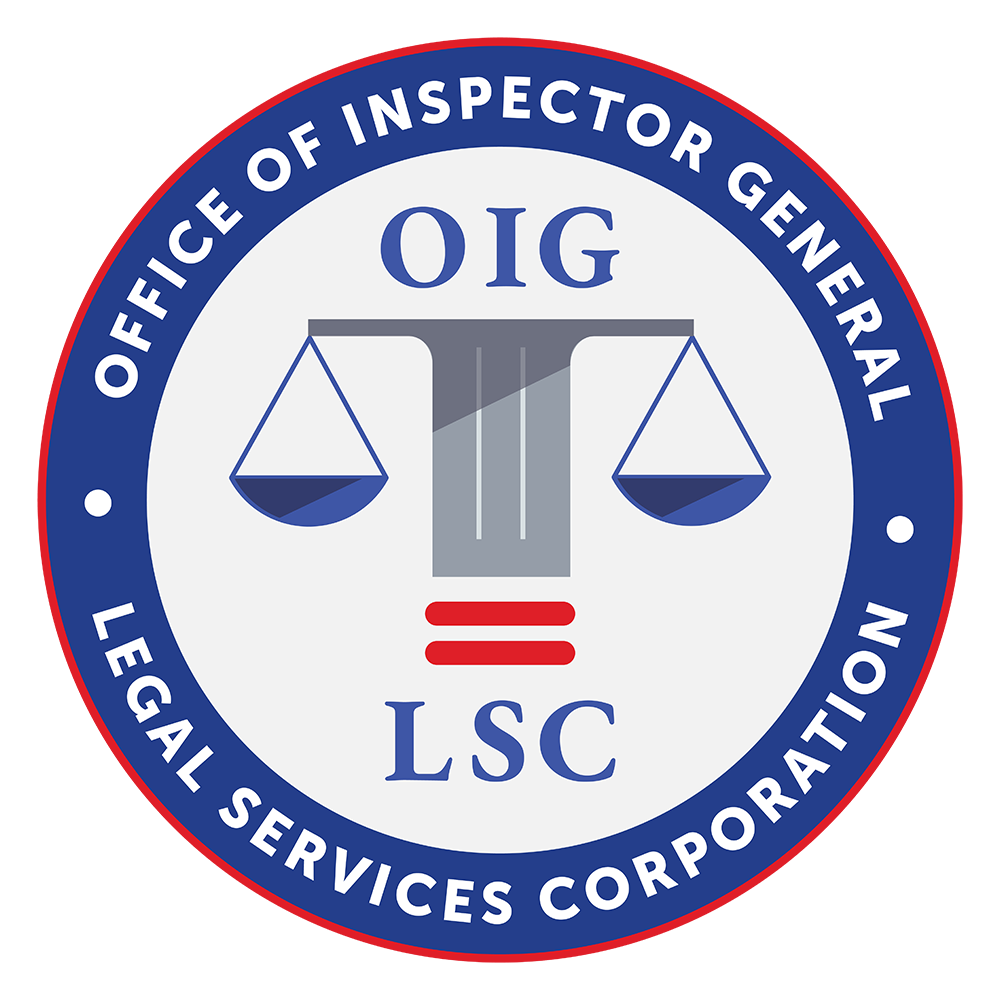 The LSC Office of Inspector General operates under the Inspector General Act. In 1988, Congress amended the IG Act and required LSC and about 30 other small, federally funded entities to establish independent Offices of Inspector General.
The LSC Office of Inspector General operates under the Inspector General Act. In 1988, Congress amended the IG Act and required LSC and about 30 other small, federally funded entities to establish independent Offices of Inspector General.
The OIG has two principal missions: to assist management in identifying ways to promote efficiency and effectiveness in the activities and operations of LSC and its grantees; and to prevent and detect fraud and abuse. Thus the OIG assists management in fostering, and overcoming obstacles to, good program management and in preventing future problems; and it must identify and report on current problems.
The OIG's primary tool for achieving these missions is fact-finding through financial, performance and other types of audits, evaluations and reviews, as well as investigations into allegations of wrongdoing. Its fact-finding activities enable the OIG to develop recommendations to LSC and grantee management for actions or changes that will correct problems, better safeguard the integrity of funds, and improve procedures or otherwise increase efficiency or effectiveness. The OIG is also tasked with ensuring the quality of audits of LSC and its grantees that are conducted by independent public accountants, and with reviewing proposed and existing regulations and legislation affecting the operations and activities of LSC and the programs it funds.
In addition to the missions shared by all OIGs, Congress, starting with LSC's FY96 appropriation, directed that the primary tool for monitoring grantee compliance with legal requirements is to be the annual grantee audits conducted by independent public accountants under guidance developed by the OIG, thus adding participation in monitoring compliance to the role of the OIG. In addition, Congress specified the OIG's authority to conduct its own reviews of grantee compliance.
The OIG is headed by the Inspector General who reports to and is under the general supervision of the Board. The IG has broad authority to manage the OIG, including setting OIG priorities and activities, and to hire OIG personnel and consultants and experts.
To ensure the objectivity of the IG, the IG Act grants the LSC IG the independence to determine what reviews are performed; to gain access to all documents needed for OIG reviews; to publish findings and recommendations based on OIG reviews; and to report OIG findings and recommendations to the LSC Board of Directors and to Congress. The IG Act also prohibits LSC from assigning to its IG any of LSC's own "program operating responsibilities." This means that the OIG does not perform functions assigned to LSC by the Legal Services Corporation Act, other than those transferred to the OIG under the IG Act, and those otherwise assigned by Congress, for example in the FY96 appropriations act.
The IG must report serious problems to the LSC Board of Directors and must also report to appropriate law enforcement authorities, when through audit, investigation or otherwise, the IG has found that there are reasonable grounds to believe that a crime has occurred. The OIG is not an "arm" of the Congress, as is the Comptroller General, but is required by law to keep the Congress informed through semiannual reports and other means. The IG also provides periodic reports to the Board and management of LSC and occasionally to the Boards of Directors and management of LSC grantees. Some of these reports will be specific (e.g., an audit of a particular grantee or an investigation of a theft), while others will be of more general interest to management.
Although the OIG is not a part of LSC management, it also is not an adversary of LSC management. To be effective, the OIG works cooperatively with the Board and management, seeks their input prior to choosing topics for OIG review, and keeps them informed of OIG activities. Within their different statutory roles, the OIG and management of LSC share a common commitment to improving the federal legal services program and increasing the availability of legal services to the poor.